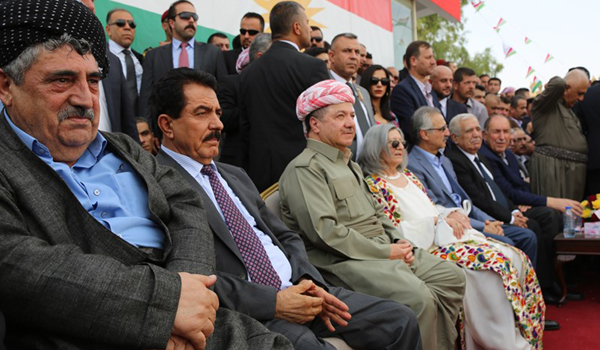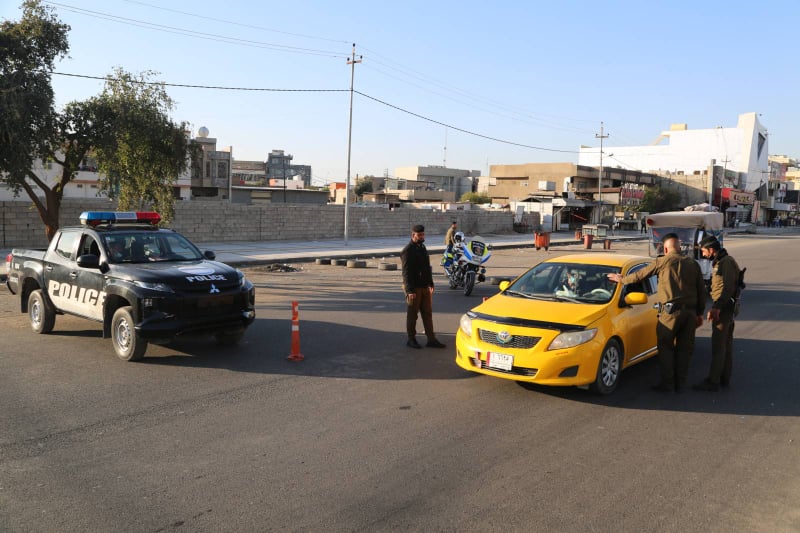Directorate of Kirkuk police has transferred the cases of 49 Kurdish police officers to Mosul martial court based on a letter by Iraqi ministry of interior, charged of participation in 2017 referendum by the Kurds in the disputed territories.
The case is dated back to November 2017, a month following 2017 referendum for independence by the Kurdistan northern region from Iraq held in the three northern provinces plus areas outside the Kurdistan Regional Government’s KRG administration, including the northern oil-rich, multi-ethnic city of Kirkuk.
The case was halted then by a political decision in Baghdad temporarily then reactivated late by March upon approval of Iraqi minister of interior. The officers rank from lieutenant up to brigadier general and still on duty.
“We have been informed that our dossiers have been pushed again on April 4th following a letter by Iraqi ministry of interior to refer us to martial court in Mosul for investigation and trial,” one of the officers anonymously told KirkukNow.
“The case has temporarily suspended yet now we doubt there are people from other ethnicities of Kirkuk behind this to fill in the posts held by Kurdish officers by people close to them,” he added.
“The case has temporarily suspended yet now we doubt there are people from other ethnicities of Kirkuk behind this to fill in the posts held by Kurdish officers by people close to them,” he added.
Iraqi ministry of interior on March 17 dictated Kirkuk police directorate upon approval of the minister to be charged by Iraqi penal code 111 of (crimes against national security) for being separatists, supporting the Kurdistan region referendum for independent.
Kirkuk, Sept. 25th, 2017: A polling station for Kurdistan region referendum in Rahimawa Kurdish dominant neighborhood of Kirkuk. Photo by KirkukNow.
Iraqi government called on the Kurds for dialogue and urged them to cancel the results. Iraqi troops ousted Kurdish troops in October 2017 upon request of Iraqi parliament to deploy federal army in the disputed territories the Kurds were controlling, part of it since fall of Saddam regime in 2003 and others following the so-called Islamic State ISIS control of one third of Iraq in 2014.
“The authorities held in charge only poor people, if not then the Iraqi president and foreign minister should also be ruled because they also took part in the referendum,” the officer added.
“The PUK and KDP have to support us the way they involved us not to keep silent.”
“The PUK and KDP have to support us the way they involved us not to keep silent.”
The two main Kurdish fractions Kurdistan Democratic Party KDP, led by Masoud Barzani, president of Kurdistan region in 2017, and Patriotic Union of Kurdistan PUK led by co-presidents, son and cousin of late Iraqi president Jalal Talabani, with some other partied form the KRG.
Another officer told KirkukNow their case has popped up in 2020 but it was freezed then.
Kirkuk, located 238 kilometers north of Baghdad, is an ethnically mixed province of Kurds, Sunni and Shiite Arabs, and Turkmen. It has long been at the center of disputed territories between Baghdad and Erbil.
International community urged the Kurds to halt the referendum, concerned about its potentially destabilizing effects on the war-torn Iraq, particularly on the battle against ISIS.
Kurds, the fourth-largest ethnic group in the Middle East, have never obtained a permanent nation state. Iraqi Kurds, make up an estimated 15- 20% of the population, have faced decades of repression before acquiring autonomy in 1991.

Sulaimaniyah, Sept. 20, 2017: Support campaign for the referendum by Barzani and some senior PUK officials. Photo by Iraqi Kurdistan Region Presidency IKRP.
KirkukNow has come to know that PUK is trying to push minister of justice to cease the case of the 49 officers. The Iraqi minister of justice is a Kurd appointed by PUK. The efforts have not come to any concrete solution yet.
One of the key officers to be charged is brigadier Sarhad Qadir, former director of Kirkuk districts and subdistricts police. His trial should go on absentia.
The referendum and its aftermath left the two long-term U.S. partners KDP and PUK accusing each other of betraying the Kurdish cause by putting Kurdish control of Kirkuk and its oil at risk by including it in the referendum, or by cooperating with non-Kurdish groups that spilled Kurdish blood in Kirkuk.
The KDP has left its bases in Kirkuk since 2017 while the PUK is keeping its offices in Kirkuk now run by acting governor, an Arab, and Iraqi troops running the security of the controversial province.





